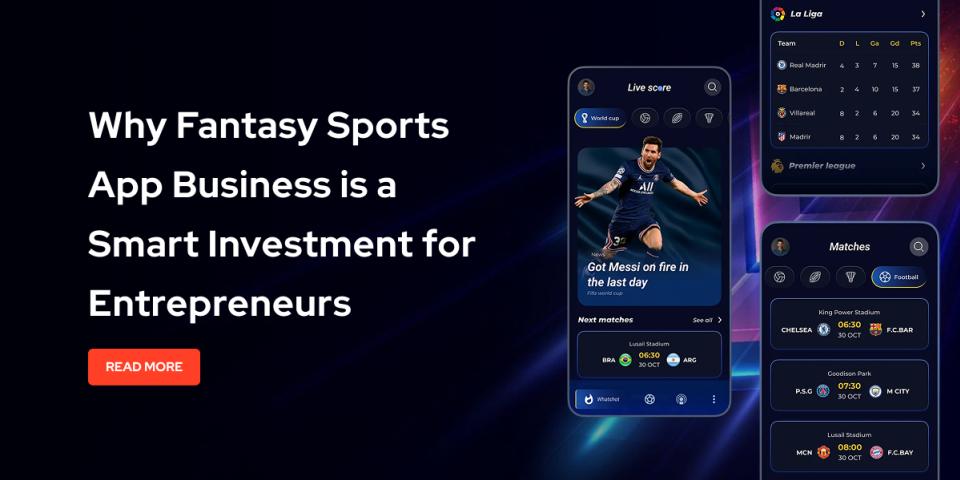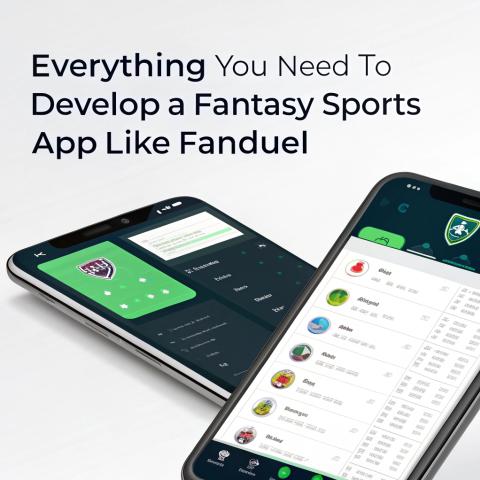If you’ve ever drafted a dream team on a fantasy sports app, you’ve probably wondered: How are these Fantasy Sports apps making so much money off me picking players and competing with my friends?
Well, you're not alone. Fantasy sports apps are one of the most exciting and profitable segments in the mobile gaming and sports industry. And the way they make money? It’s clever, it’s creative, and yes—it’s legal.
In this fantasy sports app development guide, we’re diving deep into how fantasy sports apps make money, why they’re so addictive, and what fuels their booming business model.
What Is a Fantasy Sports App, Anyway?
Let’s break it down. The fantasy sports app lets users create virtual teams of real-life players in the sports. Based on the actual performance of these players in real matches, your fantasy sports team earns points. The more points you get, the higher your rank in contests—and sometimes, that means cold, hard cash, or bragging rights.
Think of it like being a virtual team manager. You pick, trade, and bench players based on form, injury reports, or gut instinct. But here's the kicker—this virtual game is turning into a very real money-making machine.
The Fantasy App Goldmine: Main Revenue Streams
1. Entry Fees and Paid Contests (a.k.a. Rake Fees)
The biggest moneymaker? Paid contests.
Fantasy sports apps charge an entry fee for premium or cash-prize contests. You could pay $1, $5, $20, or even more to join. The app pools all the entry money and awards winners based on how their teams perform.
But here’s the twist—they don’t give 100% of the prize pool back to players.
Most apps take a commission (called a rake), usually 10–20%. For example, if 1,000 users join a $10 contest, that’s $10,000 in total. The platform might take $1,500 off the top and distribute the rest to winners.
Smart, right?
2. In-App Advertisements
If a fantasy app has a free version (which most do), ads are everywhere—banner ads, interstitials, pop-ups, and even sponsored team logos.
Big brands love advertising in fantasy apps because the user base is highly engaged and sports-obsessed. That’s marketing gold.
The more users spend time on the fantasy sports app, the more impressions advertisers get—and the more the app earns through CPM (cost-per-thousand-impressions) or CPC (cost-per-click) advertising models.
3. Freemium Model and In-App Purchases
Many fantasy sports platforms use the classic freemium model—the app is free, but goodies cost extra.
These can include:
- Exclusive player stats
- Expert lineup suggestions
- Custom team logos
- Extra transfers or boosters
It’s a win-win. Casual players stay on for free, while hardcore users pay for an edge in competitions.
4. Sponsorships and Brand Partnerships
Fantasy sports platforms often ink deals with brands for sponsorship placements. Whether it's a sports drink, apparel brand, or even a crypto exchange, companies will pay to get featured on dashboards, contest banners, or push notifications.
And since sports fans are a niche, loyal bunch, brands are happy to pay a premium for visibility.
5. Affiliate Marketing
Here’s one you might not see coming—affiliate marketing.
Some fantasy apps promote other products or services through referral links. If a user signs up or buys something through that link, the app earns a commission. Common affiliate partners include betting sites, sports gear shops, and streaming services.
6. Premium Membership Plans
Serious players want perks—and apps know it.
That’s where monthly or annual subscriptions come in. Premium members might get the following:
- Early access to contests
- Advanced analytics
- Ad-free experience
- VIP-only competitions
This recurring revenue can be incredibly stable and predictable for the business.
Why This Model Works So Well
Fantasy sports apps combine passion, competition, and a sprinkle of money—three things that hook users hard.
They keep users engaged daily during sports seasons, offer instant feedback through points, and build a strong sense of community (or rivalry). The emotional connection is powerful, which leads to longer usage sessions, better monetization, and high retention.
Monetization in DFS vs. Season-Long Fantasy
Let’s clear up a common confusion.
- DFS (Daily Fantasy Sports) platforms like DraftKings or FanDuel focus on short-term contests and cash prizes. Their revenue mainly comes from rake fees and high-volume participation.
- Season-Long Fantasy Apps (think ESPN, and Yahoo) may rely more on ads, subscriptions, and partnerships since they don’t always have real-money contests.
Both models make money—but in slightly different ways.
Legal Aspects: Is This Gambling?
It’s a grey area globally, but in many countries (including most U.S. states), fantasy sports are considered games of skill, not chance.
That’s how companies operate legally—by arguing that picking the best players takes research, strategy, and skill, not luck.
Still, fantasy apps must navigate compliance, licensing, and age restrictions, which adds to their operational fantasy sports app development cost but also acts as a barrier to entry for smaller competitors.
How Much Money Are We Talking About?
The fantasy sports industry is worth billions, and growing fast.
According to market reports, the global fantasy sports market is expected to surpass $50 billion by 2030. Some major platforms have reported annual revenues in the hundreds of millions, and smaller startups are raking in serious profits too.
Conclusion: The Fantasy Is Real—And So Are the Profits
So, the next time you're tinkering with your fantasy lineup at midnight, just remember—you're not just playing a game. You're participating in a well-oiled business model that blends entertainment, strategy, and tech into a money-making powerhouse.
Fantasy sports apps don’t just thrive on your love for the game—they monetize it brilliantly.
And hey, if you’re thinking of launching your Fantasy Sports app, now might be the perfect time. Just make sure your monetization game is as strong as your fantasy team!
FAQs
1. Do fantasy sports apps make more money from ads or contests?
It depends on the app. DFS platforms usually earn more from entry fees and rake, while free platforms rely heavily on ads and premium features.
2. Are fantasy sports apps legal everywhere?
Not quite. While many countries consider them legal, some regions treat them like gambling. Always check local laws.
3. How do free fantasy apps make money?
Through in-app ads, sponsorships, affiliate links, and optional purchases or subscriptions.
4. Can users earn money from fantasy sports?
Yes! Especially on fantasy sports platforms like DraftKings or FanDuel. But like any skill-based competition, winnings vary.
5. What’s the biggest cost of running a fantasy app?
Tech development, real-time data integration, server maintenance, and user acquisition are major expenses.







